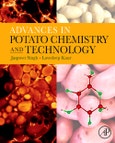Table of Contents
Introduction: Potato Tuber An Introduction1. Potato Origin and Production
2. Breeding, Genetics, and Cultivar Development
3. Cell-wall Polysaccharides of Potatoes
4. Structure of Potato Starch
5. Potato Proteins, Lipids and Minerals
6. Analysis of Glycoalkaloids, Phenolic Compounds and Anthocyanins in Potatoes
7. Thermal Processing and Quality Optimization of Potatoes
8. Advanced analytical techniques to evaluate the quality of potato and potato starch
9. Textural and Rheological Characteristics of Raw and Cooked Potatoes
10. Potato Starch and its Modification
11. Fried and Dehydrated Potato Products
12. Postharvest Storage of Potatoes
13. Nutritional Value of Potatoes: Digestibility, Glycemic Index and Glycemic Impact
14. Nutritional Value of Potatoes: Vitamin, Phytonutrient and Mineral Content.
15. Novel Applications and Non-Food Uses of Potato: Future Perspectives in Nanotechnology
16. Novel Applications and Non-Food Uses of Potato: Potatoes in biomedical/pharmaceutical and fermentation applications
17. Potatoes for Human Life Support in Space
Authors
Jaspreet Singh Riddet Institute, Massey University, Auckland, New Zealand. Dr. Jaspreet Singh, Senior Research Officer, Riddett Institute, Massey University, New Zealand. Dr. Singh's research focuses on characterising future carbohydrates to develop novel and healthy food products. He leads several research projects on potatoes, starch, cereals and supervises graduate and post graduate students at the Riddet Institute. He has characterised Taewa (Maori potatoes) of New Zealand to develop new and nutritionally rich food products. Collaboration is a key part of his research and he works in collaboration with food chemists, engineers, nutritionists, and the food industry. He is committed to sharing research with others and has published research papers in international journals, written book chapters and presented his work at international conferences. Lovedeep Kaur Riddet Institute, Massey University, New Zealand. Dr. Lovedeep Kauer is a Research Scientist at the Riddett Institute, Massey University, New Zealand. Her research work includes.In vitro digestion of different food proteins and starches.
.Physico-chemical, functional and nutritional characterization of starches from different sources; potato tubers and their flours.
.Physico-chemical and functional characterization of different polysaccharide gums.
.Development of novel food structures and exploring ways to alter the existing meat protein structures to change their digestibility profiles.
.Screening of various plant sources for their antidiabetic potential in vitro.
.Effect of kiwifruit proteases on the digestion of different food proteins.








